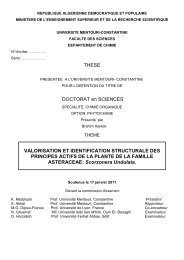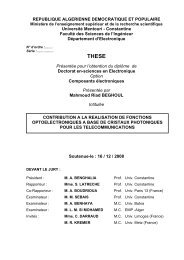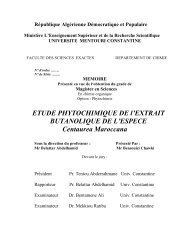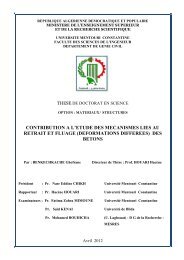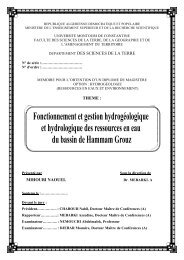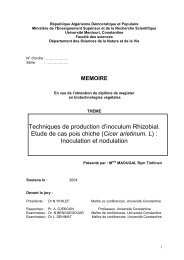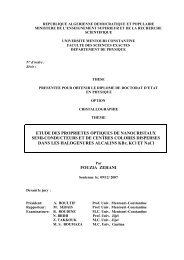- Page 1 and 2:
REPUBLIQUE ALGERIENNE DEMOCRATIQUE
- Page 3 and 4:
ACKNOWLEDGEMENTS First of all, I wo
- Page 5 and 6:
LIST OF ABBREVIATIONS ASP/FA Americ
- Page 7 and 8:
TABLE OF CONTENTS Section Dedicatio
- Page 9 and 10:
Part Two Algiers in early American
- Page 11 and 12:
CHAPTER VIII The Advent of Gunboat
- Page 13 and 14:
corsairing from within the context
- Page 15 and 16:
situated in the United States or Eu
- Page 17 and 18:
At a time the clash between Islam a
- Page 19 and 20:
may interrupt the flow of reading,
- Page 21 and 22:
elations with the United States cou
- Page 23 and 24:
Finally, other series cover miscell
- Page 25 and 26:
the same way the Mediterranean syst
- Page 27 and 28:
Part One Algiers in European Diplom
- Page 29 and 30:
States in the 1770s down to the con
- Page 31 and 32:
the Ottoman Empire. Then, he set ou
- Page 33 and 34: Mamalik Sultans, the Crusaders were
- Page 35 and 36: Maghrib, corresponding to nowadays
- Page 37 and 38: with the aim of imposing vassalage
- Page 39 and 40: 1. 3. The Spaniards in North Africa
- Page 41 and 42: western writers emphatically invoke
- Page 43 and 44: fighting for Christian faith agains
- Page 45 and 46: 1. 3. 2. Crusades in North Africa T
- Page 47 and 48: In 1541, Charles V headed an Armada
- Page 49 and 50: Spanish Expeditions against Algiers
- Page 51 and 52: 2. 1. The Coming of the Turks The f
- Page 53 and 54: Penon. The failure of the cannonade
- Page 55 and 56: Mediterranean against the Habsburg
- Page 57 and 58: Once in control of the land, Khayre
- Page 59 and 60: part of the Ottoman fleet. While th
- Page 61 and 62: In addition to Turks, the crews inc
- Page 63 and 64: the Battle of Djerba (1560), the si
- Page 65 and 66: One finds himself here far from the
- Page 67 and 68: counted 70 vessels. One hundred yea
- Page 69 and 70: Netherlands or via Jew brokers at L
- Page 71 and 72: Murad Rais, pushed corsairing out o
- Page 73 and 74: Spanish mobilized Christendom and l
- Page 75 and 76: Barbary Coast. 2 Alleging piracy an
- Page 77 and 78: chasing vessels on the high sea; wh
- Page 79 and 80: Faced with such aggressiveness, Alg
- Page 81 and 82: established perceptions, goes furth
- Page 83: (barba’rei or (بربري exis
- Page 87 and 88: Christian corsairs. Hence, accordin
- Page 89 and 90: asis for a variety of programs and
- Page 91 and 92: freedom of navigation. Slavery was
- Page 93 and 94: however, the pace of capture and en
- Page 95 and 96: slaves. 71 However, in the absence
- Page 97 and 98: 2. The Legal Context of Corsairing
- Page 99 and 100: confronts when looking into diploma
- Page 101 and 102: corsairing. 79 Therefore, it is obv
- Page 103 and 104: shipping, they operated like pirate
- Page 105 and 106: “commission of war from some fore
- Page 107 and 108: may be seen as “a cost-efficient
- Page 109 and 110: shores of the Mediterranean, the wo
- Page 111 and 112: This confusion in legal interpretat
- Page 113 and 114: fanatics who had already sworn enmi
- Page 115 and 116: treaties. 130 Not recognizing Algie
- Page 117 and 118: harm” or nothing more than a “p
- Page 119 and 120: were sometimes harsh—and in that
- Page 121 and 122: these treaties survived for more th
- Page 123 and 124: Other developments affected Algiers
- Page 125 and 126: Ireland, for example, became within
- Page 127 and 128: privileges, was going to recur to t
- Page 129 and 130: at Algiers. Later, the government a
- Page 131 and 132: utter. For this reason, visits of A
- Page 133 and 134: council of prizes, were sold by auc
- Page 135 and 136:
elations between Algiers and wester
- Page 137 and 138:
2. 1. Sovereignty The nature of the
- Page 139 and 140:
destruction of the Algerian fleet w
- Page 141 and 142:
compensation for the occupation of
- Page 143 and 144:
small in numbers to settle conquere
- Page 145 and 146:
the return of Algerian captives ens
- Page 147 and 148:
Christians’ enslavement at a time
- Page 149 and 150:
1624. 78 Third, it tells also that
- Page 151 and 152:
Table 4: Treaties of Peace and Comm
- Page 153 and 154:
Table 5: European Naval Expeditions
- Page 155 and 156:
3. Decline of Corsairing Diplomacy
- Page 157 and 158:
privateering, was not officially ab
- Page 159 and 160:
precisely the best landing place fo
- Page 161 and 162:
The renegades largely contributed t
- Page 163 and 164:
At about the same period, i.e.: beg
- Page 165 and 166:
Europe and Algiers. 112 More, as ne
- Page 167 and 168:
principles of free access to ports
- Page 169 and 170:
Part Two Algiers in early American
- Page 171 and 172:
y religious antagonism and struggle
- Page 173 and 174:
also did it with the view of making
- Page 175 and 176:
Furthermore, the expulsion of tradi
- Page 177 and 178:
legally, they did not hesitate to c
- Page 179 and 180:
the Sublime Porte opened the gate w
- Page 181 and 182:
1622. England’s relations with Al
- Page 183 and 184:
adventurers who were roaming in the
- Page 185 and 186:
“would, it is more than probable,
- Page 187 and 188:
was taken by the utmost seriousness
- Page 189 and 190:
“could still seek their fortunes
- Page 191 and 192:
But Owing to hostilities triggered
- Page 193 and 194:
“jingoistic and melioristic” Am
- Page 195 and 196:
Worst, at a time Algerian corsairs
- Page 197 and 198:
American commissioner who throughou
- Page 199 and 200:
void because they emanated from a n
- Page 201 and 202:
is shown here by Franklin’s gratu
- Page 203 and 204:
Algiers particularly as a “pettif
- Page 205 and 206:
independence, the Continental Congr
- Page 207 and 208:
Franklin, John Dickenson, Thomas Je
- Page 209 and 210:
his letter book more than did the D
- Page 211 and 212:
Congress (Art. 2). More, the delega
- Page 213 and 214:
ulers of Algiers to doubt American
- Page 215 and 216:
Conclusion The Ocean fashioned the
- Page 217 and 218:
CHAPTER V American Commercial Diplo
- Page 219 and 220:
the Americans, the Europeans were k
- Page 221 and 222:
diplomacy’. Barbary, then, became
- Page 223 and 224:
trade against the North African sta
- Page 225 and 226:
and neutrality of shipping—contin
- Page 227 and 228:
Once on the field, Franklin wrote c
- Page 229 and 230:
markets and consequently economic p
- Page 231 and 232:
American diplomatic relations becau
- Page 233 and 234:
further French intervention on thei
- Page 235 and 236:
earlier sniveling fears and accusat
- Page 237 and 238:
Dutch side what had already been de
- Page 239 and 240:
the part of that state or its subje
- Page 241 and 242:
If the British government suffered
- Page 243 and 244:
esources, and so contemptible, that
- Page 245 and 246:
of the existing ‘balance of power
- Page 247 and 248:
encouraged the piratical states to
- Page 249 and 250:
Britain and France and makes them r
- Page 251 and 252:
Then, it was only when the American
- Page 253 and 254:
every ten years according to custom
- Page 255 and 256:
according to which the draft treati
- Page 257 and 258:
American agents, however, without i
- Page 259 and 260:
American vessels, Britain hoped to
- Page 261 and 262:
Passports seemed not to bother the
- Page 263 and 264:
Algiers, and for other reasons, was
- Page 265 and 266:
was instructed to redeem cheap on t
- Page 267 and 268:
supreme admiral of the Algerian nav
- Page 269 and 270:
proper in a matter of bargain.” 3
- Page 271 and 272:
edemption, and promise of Lamb to
- Page 273 and 274:
leave favorable impressions at Algi
- Page 275 and 276:
the states warning against travel t
- Page 277 and 278:
d’Affaires Guillaume Otto to writ
- Page 279 and 280:
2. Anti-Algerian Attitudes in early
- Page 281 and 282:
American turned up at his court he
- Page 283 and 284:
His unguarded expressions, his hint
- Page 285 and 286:
Lamb’s first option was not heele
- Page 287 and 288:
extermination of that “race of se
- Page 289 and 290:
But, he carried on, “when they ta
- Page 291 and 292:
Finally, comparing the total cost o
- Page 293 and 294:
conclusion of a peace treaty with A
- Page 295 and 296:
New Diplomacy, combining self-cente
- Page 297 and 298:
Dey. That was noted by the American
- Page 299 and 300:
if there is a probability of a war,
- Page 301 and 302:
prepare to support such of the frig
- Page 303 and 304:
“union of force” open to Europe
- Page 305 and 306:
ecomes even more amazing when in th
- Page 307 and 308:
given American predilection for agg
- Page 309 and 310:
Meanwhile at Algiers, Dey Muhammed
- Page 311 and 312:
edemption of the remaining captives
- Page 313 and 314:
the Swedish consul at Algiers and r
- Page 315 and 316:
O’Brien letter supported the Swed
- Page 317 and 318:
1. 2. 1. Algiers Relations with Eur
- Page 319 and 320:
Portugal with Algiers, Britain migh
- Page 321 and 322:
Affairs, with respect to the truce.
- Page 323 and 324:
personally written to him.” 47 Th
- Page 325 and 326:
1796. 55 Meanwhile, Humphreys instr
- Page 327 and 328:
presents on the arrival of an Ambas
- Page 329 and 330:
ut diplomatically they were conside
- Page 331 and 332:
Treaty of Peace and Commerce with A
- Page 333 and 334:
passport issued by the United State
- Page 335 and 336:
known as the Naval Act of 1794, whi
- Page 337 and 338:
the mouth of hell, if the Devil was
- Page 339 and 340:
April 3, the Dey announced that, as
- Page 341 and 342:
that money for redeeming American p
- Page 343 and 344:
called a ‘string of lies.’ Many
- Page 345 and 346:
Table 7: Estimated Cost of the Trea
- Page 347 and 348:
concluded rapidly. The treaty grant
- Page 349 and 350:
the source of much dissatisfaction
- Page 351 and 352:
egency, or from the misconduct of o
- Page 353 and 354:
specifying that the United States h
- Page 355 and 356:
Eaton’s vehemence rose even more
- Page 357 and 358:
But the events that unfolded at its
- Page 359 and 360:
As annual payments in naval materia
- Page 361 and 362:
I explained to you, sir, that it wa
- Page 363 and 364:
2. Algiers-United States Diplomatic
- Page 365 and 366:
Madison, his Secretary of State, ag
- Page 367 and 368:
Lear would be able to prevail on th
- Page 369 and 370:
dated August 1810. 73 Despite that,
- Page 371 and 372:
treaty was sacred and that was agre
- Page 373 and 374:
those very weaknesses. 88 Consequen
- Page 375 and 376:
the war with France had just ended,
- Page 377 and 378:
justified by a belief in the moral
- Page 379 and 380:
On June 28, the squadron arrived at
- Page 381 and 382:
the Estedio. 118 In early April 181
- Page 383 and 384:
Monroe had played a prominent role
- Page 385 and 386:
armada and that of 1784 met the sam
- Page 387 and 388:
dated April 10, 1815. 138 The commi
- Page 389 and 390:
the United States “must hold the
- Page 391 and 392:
For sure, there were a number of al
- Page 393 and 394:
demonstration of American skill and
- Page 395 and 396:
Conclusion Although Algiers and the
- Page 397 and 398:
Table 10: The United States and Alg
- Page 399 and 400:
Timeline, 1776-1816 (continued) 180
- Page 401 and 402:
The conservative observers, however
- Page 403 and 404:
Appraisal of the long history of Al
- Page 405 and 406:
corsairing and its related activiti
- Page 407 and 408:
statutes and treaties. In this capa
- Page 409 and 410:
distinction between corsairing and
- Page 411 and 412:
altered the geopolitical concerns o
- Page 413 and 414:
and for over than two hundred years
- Page 415 and 416:
the weak finances of the Confederat
- Page 417 and 418:
use of gunboat diplomacy resulted i
- Page 419 and 420:
BIBLIOGRAPHY I. Primary Sources 1.
- Page 421 and 422:
2. Unofficial Printed Collections A
- Page 423 and 424:
3. Autobiographies, Memoirs, Journa
- Page 425 and 426:
Holbrook, Samuel F. Threescore Year
- Page 427 and 428:
Cordingly, David ed. Pirates: Terro
- Page 429 and 430:
Lambert, Frank. The Barbary Wars: A
- Page 431 and 432:
Suppression of White Christian Slav
- Page 433 and 434:
Guilmartin, John F. Jr., “The Tac
- Page 435 and 436:
_____. “The United States and the
- Page 437 and 438:
_____. “El Cid: Moslems and Chris
- Page 439 and 440:
Hale, William H. “‘General’
- Page 441 and 442:
MacLeod, Julia H. “Jefferson and
- Page 443 and 444:
Rose, Susan. “Islam versus Christ
- Page 445 and 446:
Weiss, Gillian. “Imagining Europe
- Page 447 and 448:
_____. “George Washington, Thomas
- Page 449 and 450:
Finnemore, John. Barbary Rovers, 19
- Page 451 and 452:
Pipes, Daniel. “In 1796 US Vowed
- Page 453 and 454:
Maynadies, Michel. Bibliographie Al
- Page 455 and 456:
intreated and grievously vexed, We
- Page 457 and 458:
Appendix 2 A. Treaty between Great
- Page 459 and 460:
other of His Majesty’s roads, hav
- Page 461 and 462:
Appendix 3 Plan of a Treaty with Fr
- Page 463 and 464:
not assist Great Britain in such wa
- Page 465 and 466:
Appendix 5 Adams-Jefferson Exchange
- Page 467 and 468:
those people is ineffectual, I urge
- Page 469 and 470:
consequently at the mercy of foreig
- Page 471 and 472:
and because all those powers are re
- Page 473 and 474:
Appendix 8 Hassan Dey of Algiers to
- Page 475 and 476:
Appendix 9 Treaty of Peace and Amit
- Page 477 and 478:
having a Regular pass-port Specifyi
- Page 479 and 480:
Appendix 10 A. Dey Hassan to George
- Page 481 and 482:
Appendix 11 Mediterranean Passport
- Page 483 and 484:
Silsbee, of that place, while on a
- Page 485 and 486:
In coming before the town it is usu
- Page 487 and 488:
Appendix 14 Treaty of Peace and Ami
- Page 489 and 490:
furnished at the market price, and
- Page 491 and 492:
of the United States, and the citiz
- Page 493 and 494:
said Admiral, your servant, all tha
- Page 495 and 496:
amicable sentiments towards the Uni
- Page 497 and 498:
understanding between them and the
- Page 499 and 500:
était d’aussi bonne prise que le
- Page 501 and 502:
GLOSSARY Agha Al-Jizya Armada Beyle
- Page 503 and 504:
Parias Pasha Peñón Presidio Qaid
- Page 506:
ABSTRACT Recent western writings de




